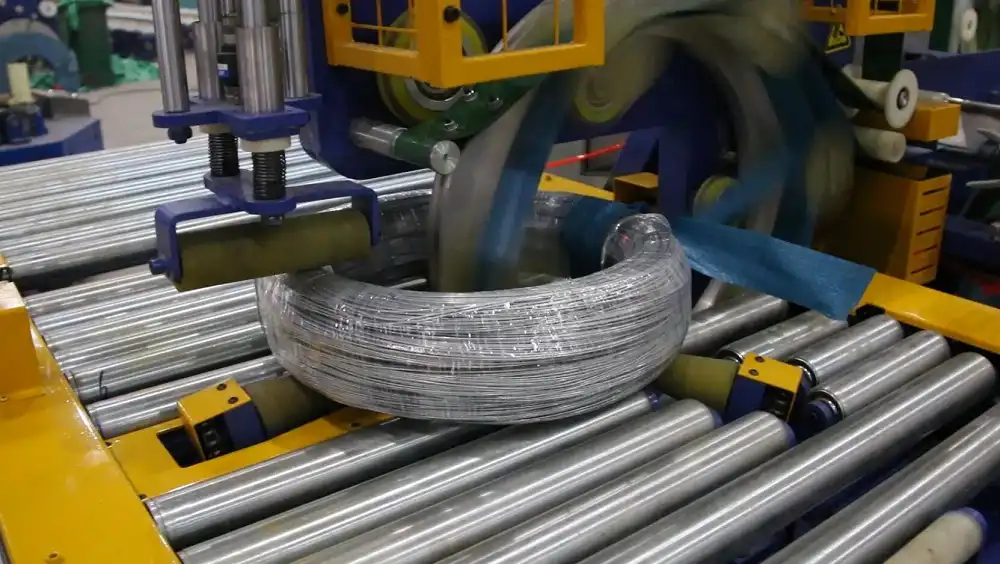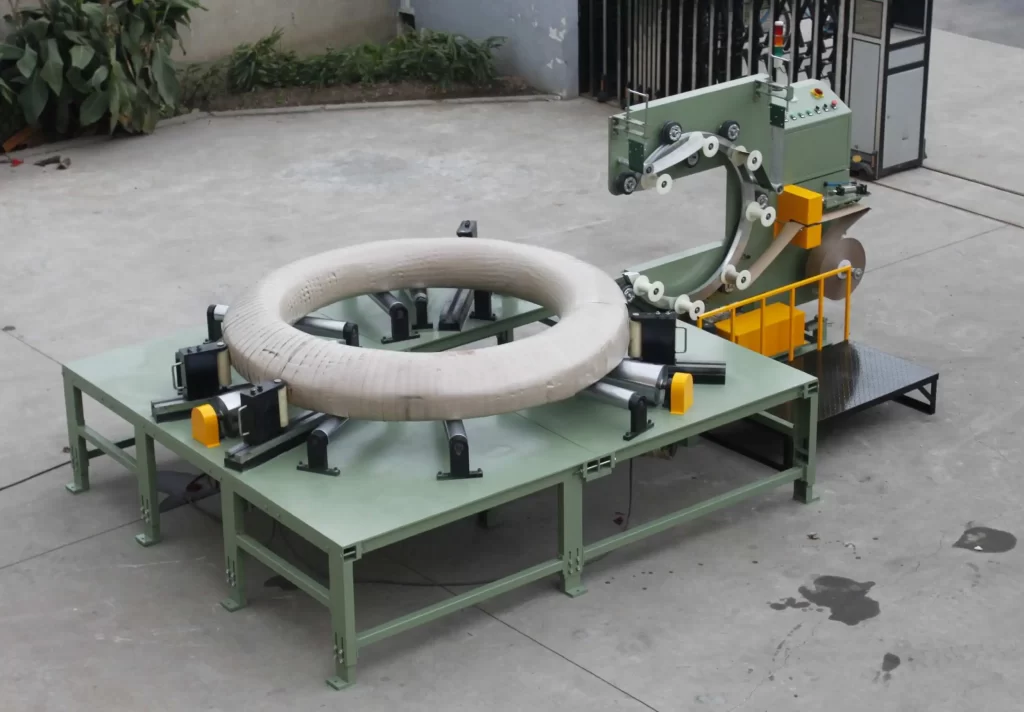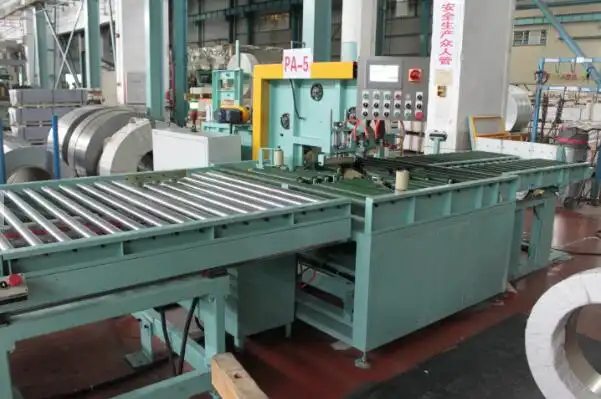In the fast-paced world of manufacturing and logistics, efficiency is the cornerstone of profitability. For operations that involve handling and shipping steel coils, coil wrapping machines have become indispensable. These machines not only streamline the packaging process but also minimize human error, reduce labor costs, and improve the overall quality of your output. However, their true value lies in the profound impact they can have on production line efficiency.
[featured image: A modern coil wrapping machine seamlessly integrating with an industrial production line.]
From automated workflows to enhanced precision, a coil wrapping machine is more than just a tool—it's an investment in the future of your production line. Businesses that integrate these machines often experience faster turnaround times, lower material waste, and improved worker safety.
The question is, how exactly does a coil wrapping machine enhance efficiency, and what should you consider when choosing one for your operation? Let’s explore the technical aspects and the tangible benefits of these machines in depth.
Table of Content
- Why is efficiency critical in modern production lines?
- What are the key features of coil wrapping machines that boost efficiency?
- How does automation in coil wrapping reduce costs and errors?
- Can advanced wrapping technology future-proof your operations?
1. Why is efficiency critical in modern production lines?
1.1 The impact of inefficiencies on productivity
In any production line, inefficiencies—be it manual errors, inconsistent processes, or bottlenecks—can have a cascading effect. Delayed packaging leads to slower shipping, missed deadlines, and, ultimately, dissatisfied customers.
A coil wrapping machine addresses these inefficiencies by standardizing the wrapping process. With consistent speeds and uniform wrapping quality, these machines ensure that your operations run like clockwork, without interruptions caused by human variability.
1.2 The role of precision in quality control
When wrapping steel coils manually, inconsistencies are almost inevitable. Uneven tension, improper alignment, or material overlaps can compromise product protection during transit. Coil wrapping machines eliminate these issues through precise control mechanisms that deliver uniform results every time.

[featured image: A close-up of a coil wrapping machine applying even tension and wrapping material with perfect alignment.]
Precision directly correlates to efficiency. By maintaining high-quality standards on the production line, you avoid costly rework and improve customer satisfaction, enhancing your brand’s reliability in the market.
1.3 Meeting the demands of high-volume production
Modern manufacturing often involves large-scale operations, with thousands of coils requiring packaging in a short time frame. Manual methods simply cannot keep up with these demands. Coil wrapping machines, however, are designed for high-speed operation, ensuring that even large production volumes are handled efficiently and on schedule.
2. What are the key features of coil wrapping machines that boost efficiency?
2.1 Automated tension control and wrapping precision
One standout feature of coil wrapping machines is automated tension control. This mechanism ensures that the wrapping material is applied with consistent force, avoiding loose wraps or excessive tightness that could damage the product.
Automated systems also enhance precision, aligning the wrapping material perfectly to cover the entire coil surface. This consistency minimizes waste and ensures optimal protection during storage and transit.

2.2 High-speed operation for faster turnaround
Coil wrapping machines are built to handle high-speed operations without sacrificing quality. With adjustable wrapping speeds, these machines can accommodate varying production requirements, from small-scale custom orders to large-volume shipments.
[featured image: A high-speed coil wrapping machine wrapping multiple coils in sequence on an automated production line.]
Speed, combined with precision, means less time spent per unit and more products ready for shipment, directly improving your production line’s throughput.
2.3 Integration with production line automation
Many coil wrapping machines are designed to integrate seamlessly with existing production line automation systems. Features like conveyor integration, automated loading, and sensor-based operations allow for continuous workflows without manual intervention.
This integration eliminates downtime associated with manual handling, enabling a smooth transition between different stages of the production process.
3. How does automation in coil wrapping reduce costs and errors?
3.1 Lowering labor costs through automation
Manual wrapping processes are labor-intensive, requiring skilled workers to handle each coil individually. This not only increases labor costs but also introduces variability and potential for errors. Coil wrapping machines automate these tasks, allowing operators to oversee multiple machines rather than performing repetitive manual work.
By reducing reliance on manual labor, businesses can allocate resources more efficiently while maintaining consistent packaging quality. The initial investment in automation quickly pays off through labor savings and enhanced productivity.
3.2 Reducing material waste
Manual wrapping often leads to excess material usage due to uneven application or overwrapping. Coil wrapping machines, on the other hand, optimize material usage with precise controls. Features like programmable wrapping patterns ensure that only the required amount of material is used, minimizing waste without compromising protection.

[featured image: A coil wrapping machine using stretch film efficiently, with minimal waste visible on the production line.]
Over time, these savings on wrapping materials add up, further reducing operational costs and contributing to a more sustainable production process.
3.3 Minimizing errors and improving consistency
Inconsistencies in manual wrapping can result in poorly secured coils that are susceptible to damage during transit. Coil wrapping machines eliminate these errors through advanced control systems that monitor and adjust the wrapping process in real time.
Features such as automatic coil alignment and tension control ensure that each coil is wrapped to exact specifications. This level of consistency not only reduces rework but also enhances customer satisfaction by delivering high-quality, professionally wrapped products.
4. Can advanced wrapping technology future-proof your operations?
4.1 Adapting to evolving production demands
As production volumes and customer expectations grow, so do the demands on your packaging processes. Advanced coil wrapping machines are designed with scalability in mind, offering modular features and programmable settings that can adapt to increasing workloads or new product specifications.
Investing in machines with flexible configurations ensures that your production line can accommodate changes without requiring a complete overhaul, saving both time and resources.
4.2 Enhanced features for specialized applications
Modern coil wrapping machines often come equipped with features tailored for specific needs, such as moisture-proof wrapping for outdoor storage or reinforced strapping for export shipments. These specialized options allow businesses to meet diverse customer requirements without compromising efficiency.
[featured image: A coil wrapping machine applying moisture-resistant wrapping for coils destined for long-term outdoor storage.]
Such capabilities future-proof your operations, ensuring that you remain competitive in a market where customization and adaptability are increasingly valued.
4.3 Integration with Industry 4.0 technologies
The rise of Industry 4.0 has brought smart technologies to manufacturing, and coil wrapping machines are no exception. Many advanced models offer IoT-enabled monitoring, predictive maintenance alerts, and real-time data analysis to optimize performance.
By integrating these technologies, businesses can track machine performance, identify inefficiencies, and implement improvements proactively. This level of insight enhances overall operational efficiency and keeps your production line ahead of the curve.
Conclusion
Coil wrapping machines are transformative tools for improving efficiency in production lines. By automating critical tasks, reducing material waste, and minimizing errors, these machines ensure consistent, high-quality output while lowering operational costs. Their advanced features, from high-speed operation to Industry 4.0 integration, not only address current production challenges but also prepare businesses for future demands.
[claim: Investing in a coil wrapping machine tailored to your production needs is more than a cost-saving decision—it’s a step toward long-term efficiency, scalability, and market competitiveness.]
By choosing the right machine and leveraging its capabilities, you can optimize your production line, meet customer expectations, and secure a competitive edge in an ever-evolving industry.